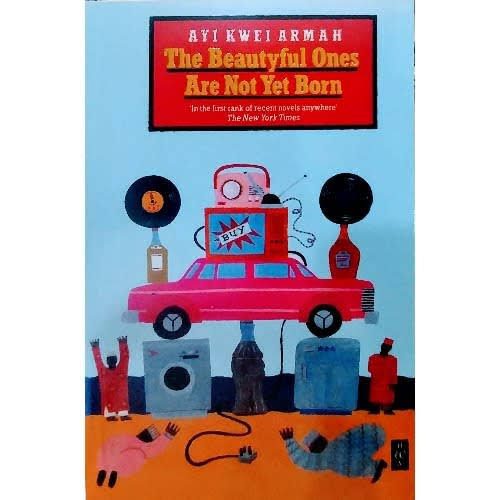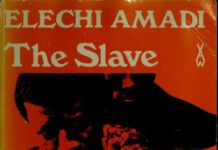Chapter Eleven
At the beginning of this chapter, the man and his wife, Oyo, are trying to hail a cab on their way to Koomson’s house. While Oyo is being picky about finding a convenient one, they eventually enter a new Toyota and Oyo begins her usual conversation about luxury.
The driver quickly points out that the car is not produced by Africans, and he states, “We Africans only buy expensive things” (p. 140), expressing his displeasure with their reliance on imperialism and cultural penetration.
However, Oyo seems uninterested and sits as if she owns a dozen of these cars. They arrive in the upper residential area where Koomson’s house is located. The driver jokes about whether there is an area that is not for living, but the man explains that the sign simply indicates a residential area.
Once they arrive at Koomson’s house, the couple reflects silently on what they see around the house and make some unfavorable comparisons with their own home.
Koomson is disappointed to find that the old woman who was supposed to sign the paper for the fishing boat is not there, and the man refuses to sign it himself. However, Oyo quickly acquiesces to sign it. They later take a drive to Kwesi’s house, who is the crewman on the boat. After Koomson introduces the couple to Kwesi, everyone goes their way.
Chapter Twelve
Each time the man sees the boat harbor, he expresses his delight at its beauty. The name of Koomson’s daughter, ‘Princess’, is written at the side of the boat.
He becomes exuberant by the boat’s beauty but it does not meet Oyo’s mother’s standard in terms of income. Oyo receives ‘parcels of fish’ from Koomson but her husband resents it when it is cooked for him.
He says, “Please don’t cook any more fish for me” (p. 153). All hopes have turned into disappointments. There is a commission headed by a professor from Legon that aims to get rid of the country’s corrupt trade, but in the end, it only catches people who commit gross misdemeanors.
Chapter Thirteen
In the office, the man is lonely, sad, and thoughtless. A messenger enters and breaks the news at dawn: another coup in Ghana. The whole office is disrupted, with both senior staff who come to work and the dutiful junior staff entering.
The news is circulating that all the “big party men” have been arrested and placed in a place called “protective custody” – a new area for old imprisonment without trial. The entire street is in commotion.
A trade unionist under the overthrown government rushes into the office and officially announces the coup, ordering the workers to join the mob outside to demonstrate their disapproval of the abrupt development. Only the man refuses to go out.
Apparently, the coup has just swept in the Nkrumah and his members, and the unionist insists that the man should go out to join the protest, but he gives the excuse: “If two trains collide while I’m demonstrating, will you take the responsibility?” (p.158), even though that does not matter at the moment. The unionist later joins the angry mob outside to protest when he realizes the man is not going to change his opinion.
Deep inside him, the man is happy because the corrupt regime and its disguised capitalists have just been overthrown. Upon arriving home, he sees his wife outside looking worried and confused.
Precipitately, Oyo breaks the news: Koomson is hiding inside their house. “Koomson is inside,” she says. He has to run away to avoid being swept away by the coup. The man doesn’t know what to say at the moment and follows his wife to see where he’s hiding.
They stare at each other for a while. Eventually, Koomson, out of fright, whispers silently to the man, “They will kill me.” Even though the man does not want Koomson to utter any word at that moment, Koomson whispers another word, “They will come here.”
At this point, the man has to do something to avoid being caught for treason against the new administration. The man asks if anyone saw him before entering, but the fugitive minister is uncertain of the answer.
There is a bad odour coming out from the minister, and the man asks whether he would like to take a bath, but the relevance of smelling nice is not needed in the face of death, so he refuses. He further asks whether he has eaten, which is obviously “no,” and the man gets Oyo to serve him food.
The man goes to meet Oyo where she sits, and for the first time in their marriage, Oyo appreciates the man’s “beauty.” She says, “I am glad you never became like him” (p. 165).
Outside, there are angry searchers for the “party men,” and their noise is getting closer to the man’s house. Koomson is hidden in a hole with the help of the man, and afterwards, they seek a way out of the house.
Chapter Fourteen
Koomson and the man try to escape through the fishing harbor to the east. After a series of risky scenes, they get to the boatman’s house, who is Koomson’s servant, and here is an erstwhile master who is as weak as the boatman himself.
Koomson, in a humble tone, reminds the boatman of his proverb, “when the bull grazes, the egret also eats” (174). He seeks the boatman’s help and promises to give him half of the boat if he agrees to help them.
The boatman grumbles but says yes. They begin their journey. Upon getting to the harbor gate, they meet the watchman who threatens them with a whistle but does not blow it. He says, “you tink say ah no sabe, ah sabe. Ah sabe say you be Nkrumah party man. You no fit pass” (175).
The boatman quickly understands and tells the minister to give him money. The man brings out his wallet, and the boatman takes it from him, checks it, and hands over ‘fifty cedi’ to the watchman, who of course disagrees and requests for more. “Put one more on top,” he says.
The man asks the boatman, who is holding Koomson’s wallet, to check if there are any more notes. Eventually, another note is added, and they are allowed to pass.
They have successfully escaped and are now on the boat. The man asks Koomson about his wife, Estella, and Koomson replies that she will be all right. As they approach Essikado, they get off at the bay and bid farewell to each other with a handshake.
Chapter Fifteen
The man takes a solitary swim in the sea, and for the first time, he does not feel sad despite being alone. His mind becomes filled with thousands of imaginations.
On his way back home, when he reaches the town boundary at the bottom of the hill where the Roman Catholic School is located, there is a barrier on the road with soldiers and policemen conducting searches and implementing stop-and-go procedures.
As usual, and most shocking of all, despite the new administration, corruption still persists, and the police and military are collecting bribes. One of the car drivers that just paid a bribe to the police officer notices the man, who decides to observe what is happening at the barricade.
The driver smiles at him and speeds away. On the back of the car is an inscription carefully lettered to form an oval shape that reads: THE BEAUTYFUL ONES ARE NOT YET BORN.
 WHATSAPP: Click HERE to join the new Literature PADI WhatsApp group to receive latest updates on your phone and for further literary discussions!
WHATSAPP: Click HERE to join the new Literature PADI WhatsApp group to receive latest updates on your phone and for further literary discussions!








